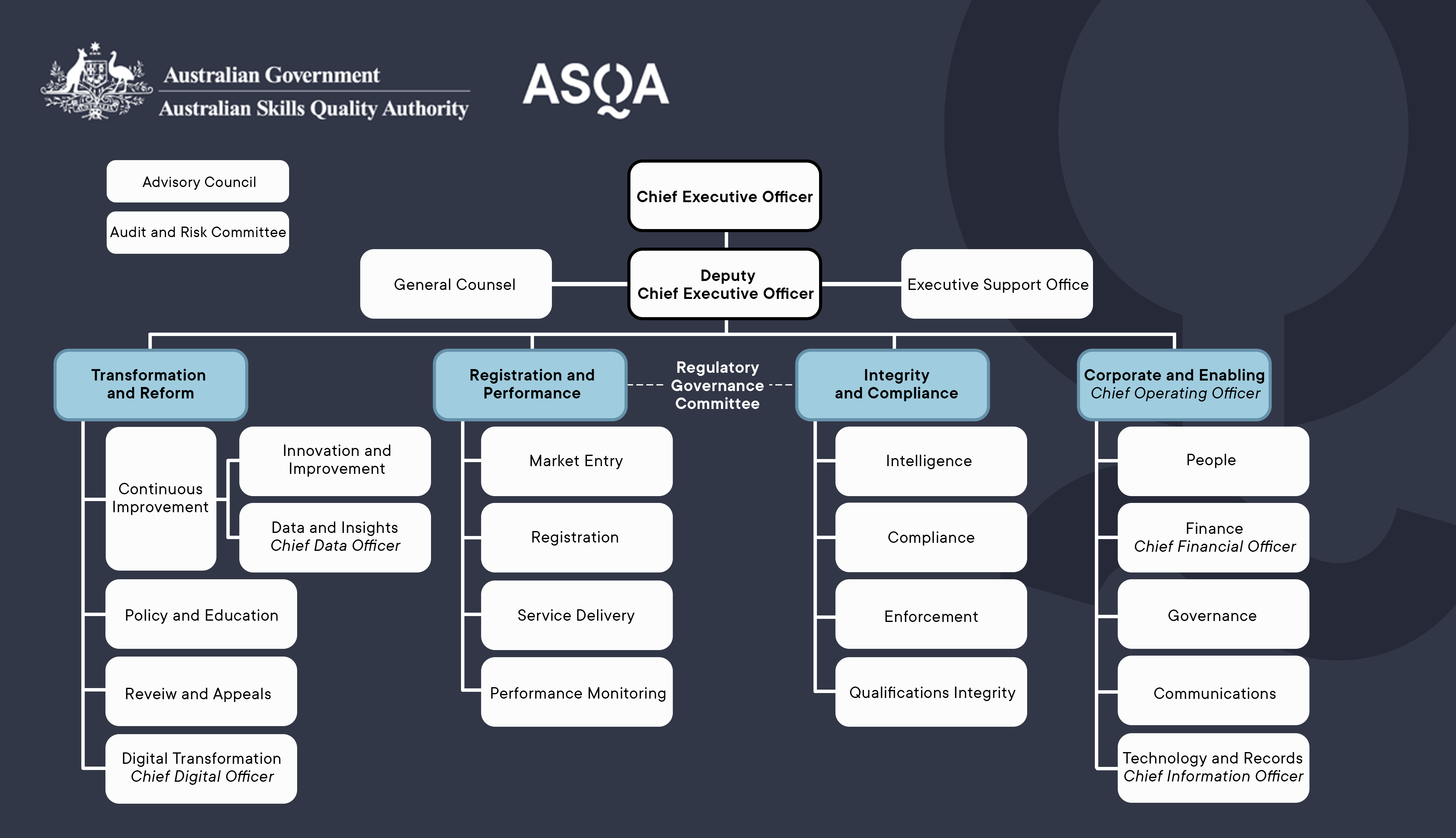- Home
- About us
- ASQA overview
- Our leadership and organisation
Our leadership and organisation
The Accountable Authority is ASQA’s Chief Executive Officer (CEO), who is appointed for a period of five years.
The Hon Andrew Giles MP, Minister for Skills and Training, provided ASQA with a Ministerial Statement of Expectations on 22 December 2025.
The Ministerial Statement of Expectations outlines Minister Giles’s expectations of ASQA as a best-practice regulator, with a focus on performance in the context of the Australian Government’s commitment to productivity.
In line with the Regulator Performance Guide, ASQA is developing a Statement of Intent in response to these expectations which will be published soon.
Chief Executive Officer
CEO Saxon Rice has extensive experience across the VET and employment services sectors as well as the public policy process. Ms Rice previously held a range of senior government, VET and management positions. She was Assistant Minister for Technical and Further Education in the former Queensland Government from 2012 to 2015, and Chair of the then Ministerial Industry Commission responsible for industry engagement.
Ms Rice is a former Director of Global Business Development for an Australian employment services company and was responsible for significant growth into new countries in the European and Asian markets. Ms Rice has also served in a range of Senate Committee Secretariats, including as Acting Secretary and Principal Research Officer to the Senate Foreign Affairs, Defence and Trade Committee. More recently, she was a Member of the Administrative Appeals Tribunal from 2016 to 2018 and is a Member and Graduate of the Australian Institute of Company Directors.
Ms Rice commenced as a Commissioner of ASQA on 16 April 2018, before being appointed as Chief Commissioner and CEO (initially Acting) on 7 October 2019. Following legislative changes to the governance of ASQA, with effect from 1 January 2021, Ms Rice was appointed CEO for a period of 5 years, and she has since been reappointed to 30 June 2027.
Deputy Chief Executive Officer
Vidoshi commenced as Deputy CEO in December 2025.
Vidoshi Jana is an experienced senior public sector leader and the Deputy Chief Executive Officer of the Australian Skills Quality Authority (ASQA). With more than two decades of leadership across crisis management, governance, people and culture, finance and major organisational reform, she is recognised for her strategic insight and ability to lead transformation in complex, high pressure environments.
Before joining ASQA, Vidoshi served as Chief Operating Officer of the National Emergency Management Agency (NEMA), where she played a central role in the design, establishment and approval of the agency. Her leadership in this work earned her the Public Service Medal in 2024. At NEMA, she oversaw national disaster recovery funding exceeding $30 billion, organisational assurance, operational readiness, and delivery of corporate services supporting a workforce of around 500.
Her career also includes senior executive roles in the Department of Home Affairs, leading national crisis coordination, COVID 19 operations, enterprise HR reform, payroll transformation, FOI uplift and major Machinery of Government changes. As Chief Finance Officer at ComSuper, she provided strategic oversight of superannuation funds, pension payments and financial governance.
Vidoshi is a Fellow CPA, a Graduate of the Australian Institute of Company Directors, and a Certified HR Practitioner, committed to ethical leadership and strengthening outcomes for the Australian community.
Senior Leadership
Fiona O'Brien, Executive Director, Transformation and Reform. With a future focus steering programs and projects though Continuous Improvement, Innovation, Data, Policy and Education advice to inform VET sector and whole of government regulatory reform, Review and Appeals, and ASQA’s Digital Transformation.
Denise Lowe-Carlus, Executive Director, Registration and Performance. Responsible for leading a number of regulatory teams at ASQA including Market Entry, Registration, Service Delivery, and Performance Monitoring.
Carmen Basilicata, Executive Director, Integrity and Compliance. Responsible for Intelligence, Compliance, Enforcement operations to prevent and detect threats to the integrity of VET, and to deter and disrupt illegal behaviour and the exploitation of vulnerable students. Carmen is also responsible for management of impacts on issued qualifications ensuring qualification validity.
Ty Emerson, Executive Director, Corporate and Enabling (Chief Operating Officer). Responsible for leading ASQA’s People , Finance , Governance, Communications, Technology and Records functions. Ty is also ASQA’s Diversity Champion, and Privacy Champion.
Organisation structure
Below is ASQA’s national organisation structure, as at 2 February 2026.

Related links
Share
